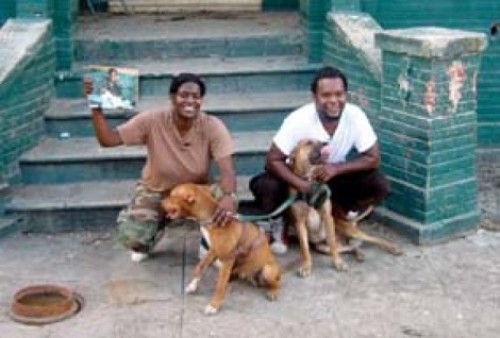Cinema | True Flood: Trouble the Water is a wake-up call for the enlightened and the condescending.
By MaryAnn JohansonIf you consider yourself an enlightened, civilized person, as I consider myself to be, then you have no need to have it explained to you that the media characterization of many of those victimized by Hurricane Katrina in 2005 was intensely unfair, to the point of exposing a bigotry that is rarely on such vivid display in America. Like me, you scoffed at the notion that many people stayed behind in New Orleans out of stupidity or stubbornness. Even if that might have been said about a few scattered characters here and there, certainly it was poverty and lack of opportunity that kept so many people close to their homes even in the face of extreme danger.
nAnd, sure enough, that’s precisely what we see in Trouble, which consists in large part of vérité camcorder footage shot by Ninth Ward resident Kim Rivers Roberts, who notes in her voiceover as she talks to her neighbors also left behind that, “If I had wheels, I’d be goin’.” And, why not? The mayor, archival news reports show us, has ordered a mandatory evacuation ahead of the approaching storm, even if he has neglected to offer any public transportation to evacuate those who cannot escape on their own. Roberts tried to get a rental car but couldn’t, she says; it’s left to us to wonder whether that was because there simply were no cars to be had, or because she may have lacked a credit card or other luxuries, like ready access to cash, some of us take for granted would help us in a similar situation. We nod along sagely, aware of all of the roadblocks in the way of someone like Roberts, and shake our heads, ashamed of the cultural disgrace the storm ripped open.
nRoberts’ camcorder reportage—organized by Fahrenheit 9/11 and Bowling for Columbine producers Tia Lessin and Carl Deal, and supplemented by other material (such as heart-rending 911 calls for help that can not be dispatched)—continues through the storm, capturing the self-organized rescues carried out by Roberts’ husband and one of the couple’s friends, as they braved the treacherous floodwaters drowning the Ninth Ward to pull neighbors from attics and gather together everyone they could save. We are disgusted, and rightly so, at the hideously ignorant disdain of one National Guardsman, who dismisses the likes of Roberts and her friends and family as people with “no concept of how to survive.” For we’ve seen, right here—and suspected it already—that just because people like Roberts have no resources and no hope doesn’t mean they cannot fend for themselves, even as they are abandoned by government and their fellow humans.
nEventually, it comes as a wake-up smack in the face to the likes of me, however, to realize I’ve been so condescending to assume the likes of Roberts have no resources … because I’ve been thinking of resources as merely the material kind. Roberts’ footage, and her story as it continues when she does finally escape from New Orleans after the storm, makes it perfectly plain that this is a woman of extraordinary mettle and strength and pride, even as she herself continues to see the veneer of civilization pulled away to reveal the Third World nation underneath it. (What she—and we—learn about how her brother, in jail in NOLA, and her grandmother, in a hospital there, were abandoned during the storm is absolutely appalling, and it would shatter most of us more than it appears to defeat Roberts.)
nThis is what shames me the most about how I, enlightened creature that I am, was thinking of Kim Rivers Roberts all through the film: We’re told, over and over again, that she is an aspiring rapper. And, of course, I metaphorically rolled my eyes at that, because who the hell isn’t an aspiring rapper these days? But then, toward the end of the movie, Kim finally catches up with some of her belongings that had been safely outside the city, and plays for us a CD of one of the songs she has written and performed. And it is an amazing piece of work: powerful and profound, a telling of her life story that is a grand testament to what enormous obstacles she has overcome in her life, and an imprecation not to condescend to her in response to that.
n“I don’t need you to tell me that I’m amazing,” she raps. And she doesn’t.
n nTROUBLE THE WATER
n
nDocumentary, Kim Rivers Roberts, Not Rated
More by MaryAnn Johanson
-
Feature movie review: Society of the Snow
A new adaptation finds new power in a 50-year-old event.
- Jan 3, 2024
-
Film Reviews: New Releases for Dec. 8
The Boy and the Heron, Maestro, Eileen, Leave the World Behind
- Dec 7, 2023
-
Feature movie review: MAESTRO
Bradley Cooper's Leonard Bernstein biopic avoids cliché and offers electrifying audacity
- Dec 6, 2023
- More »




